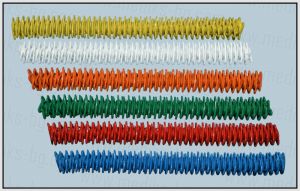Botanical Name: Pogostemon cablin.
Origin: Indonesia.Although this essential oil may remind people of the hippie era, its value in skincare is incalculable. It is also great for fighting depression and anxiety. It has great diuretic properties and also helps break down cellulite, while stimulating the regeneration of skin cells, speeding up healing and preventing ugly scars forming when wounds heal.
Oil properties: Patchouli oil has a rich musky-sweet, strong spicy and herbaceous smell. It is light yellow to dark brown in color and is a thick oil.
Origin of patchouli oil: It is a perennial, bushy plant that grows up to 1meter (3 feet) high, with a sturdy, hairy stem and large, fragrant, furry leaves, about four inches long and five inches across. It has whitish flowers tinged with purple.
The plant is native to Malaysia and India, where it is known as 'puchaput'. The word is derived from Hindustan word 'patch' meaning 'green' and 'ilai' meaning 'leaf.'
It was placed between Indian cashmere shawls en route to Victorian England, to protect the merchandise from moths, and without this signature smell of dried patchouli leaves the shawls could not be sold in England.
In the East, it is used in potpourris and sachets and place between linen, to keep bedbugs away, and it is the smell of patchouli oil, mixed with that of camphor, that gives Indian ink its characteristic smell.
Extraction: Patchouli oil is extracted from the young leaves which are dried and fermented prior to steam distillation and yields 2 - 3 %. This oil improves with age to have a fuller, more well rounded odor.
Chemical composition: The chemical components of patchouli oil are b-patchoulene, a-guaiene, caryophyllene, a-patchoulene, seychellene, a-bulnesene, norpatchoulenol, patchouli alcohol and pogostol.
Precautions: It is non-toxic, non-irritant and non-sensitizing, but the smell of patchouli oil may be a little persistent for some people and large doses may cause loss of appetite in some individuals.
Therapeutic properties: The therapeutic properties of patchouli oil are antidepressant, antiphlogistic, antiseptic, aphrodisiac, astringent, cicatrisant, cytophylactic, deodorant, diuretic, febrifuge, fungicide, insecticide, sedative and tonic.
Uses: Patchouli oil has a grounding and balancing effect on the emotions and banishes lethargy, while sharpening the wits, fighting depression and anxiety. It is also said to create an amorous atmosphere.
It is effective for fungal and bacterial infection and is of great help for insect bites. It could also be used as an insect repellant and is also used as a support for dealing with any substance addiction.
With its excellent diuretic properties, it is effective in fighting water retention and to break up cellulite, easing constipation and helping to reduce overweight.
Furthermore, it has a great deodorizing action, and helps when feeling hot and bothered, while cooling down inflammations and assisting with wound healing.
On the skin, this oil is one of the most active and is a superb tissue regenerator, which helps to stimulate the growth of new skin cells. In wound healing, it not only promotes faster healing, but also helps to prevent ugly scarring when the wound heals.
Patchouli oil is very effective in sorting out rough, cracked and overly dehydrated skin and is used to treat acne, acne, eczema, sores, ulcers, any fungal infections, as well as scalp disorders.
Summary: Patchouli oil has a beneficial effect on the skin, helps for infections and insect bites, water retention and can help with stress related problems and addictions.
-
Burners and vaporizers: In vapor therapy, patchouli oil can be used to fight anxiety and depression, while at the same time creating a very amorous atmosphere and acting as an insect repellent.
-
Blended massage oil or in the bath: As a blended massage oil or diluted in the bath, patchouli oil can help to fight depression, skin and scalp complaints, fungal infections, fluid retention, help to break down cellulite and also assists with constipation, overweight and dermatitis.
-
Neat: Patchouli oil can be applied neat with a cotton bud on insect bites.
-
Lotions and creams: In a lotion or cream, patchouli oil can be used for general skin care, as it has superb tissue regenerating properties, to help rejuvenate the skin and stimulate the formation of new skin cells, while fighting infections. It also speeds up healing, while preventing the wound forming ugly scars and is effective for acne, eczema, weeping sores, ulcers, slow healing wounds, scalp disorders, as well as other fungal infections, such as athlete's foot.
Patchouli oil blends well with: Although essential oils blend well with one another, patchouli oil blends particularly well with bergamot, clary sage, geranium, lavender and myrrh.
Important Note: The information provided is for educational purposes only.






